PHP Blog
-
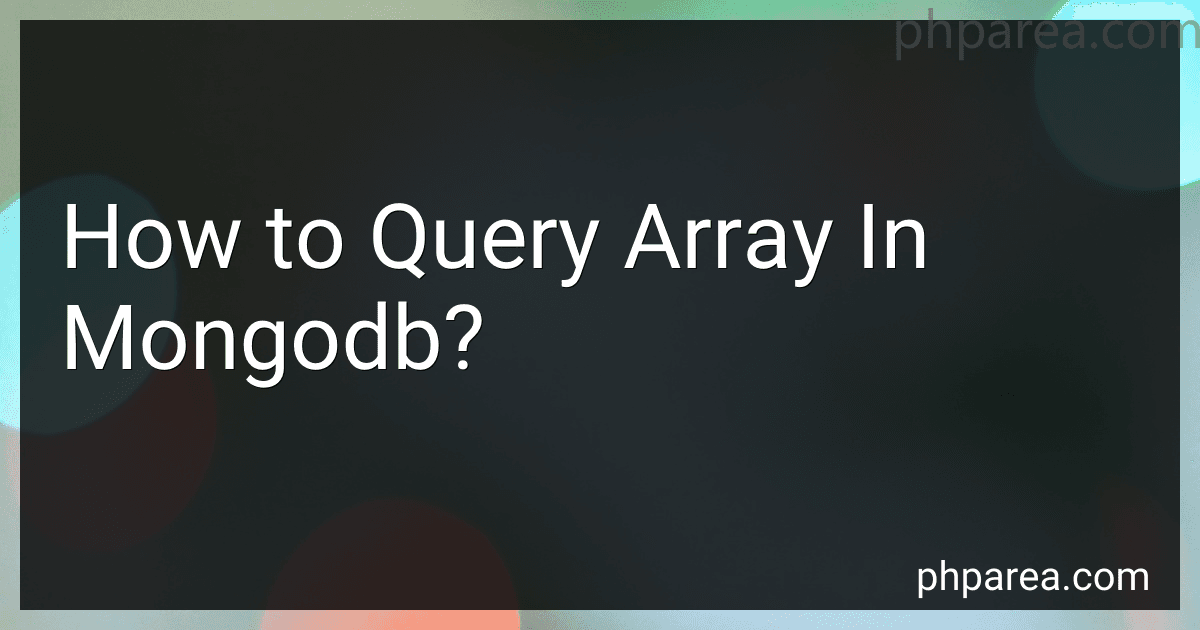 8 min readQuerying an array in MongoDB involves using specific query operators to match conditions within array fields. You can use the $elemMatch operator to find documents where an array field contains at least one element matching the specified criteria. For filtering documents where an array contains a specific element, you simply use the exact value within your query. To check if an array contains all elements of a specified list, you can use the $all operator.
8 min readQuerying an array in MongoDB involves using specific query operators to match conditions within array fields. You can use the $elemMatch operator to find documents where an array field contains at least one element matching the specified criteria. For filtering documents where an array contains a specific element, you simply use the exact value within your query. To check if an array contains all elements of a specified list, you can use the $all operator.
-
 11 min readTo build a query in MongoDB, start by connecting to your MongoDB database using a client like MongoDB Compass or the MongoDB Shell. Once connected, select the appropriate database and collection where you want to run your query. MongoDB queries are constructed using JSON-like syntax, making them intuitive for those familiar with JSON. To query documents in a collection, use the .find() method, passing in a query document that specifies the criteria for matching documents.
11 min readTo build a query in MongoDB, start by connecting to your MongoDB database using a client like MongoDB Compass or the MongoDB Shell. Once connected, select the appropriate database and collection where you want to run your query. MongoDB queries are constructed using JSON-like syntax, making them intuitive for those familiar with JSON. To query documents in a collection, use the .find() method, passing in a query document that specifies the criteria for matching documents.
-
 12 min readIn MongoDB, the concept of creating a "collection within a collection" does not exist because MongoDB does not support hierarchical structures for collections. Instead, MongoDB is designed to handle document-based data structures where collections contain documents that can have nested fields. If you want to represent a hierarchical or nested structure, you can embed documents within other documents.
12 min readIn MongoDB, the concept of creating a "collection within a collection" does not exist because MongoDB does not support hierarchical structures for collections. Instead, MongoDB is designed to handle document-based data structures where collections contain documents that can have nested fields. If you want to represent a hierarchical or nested structure, you can embed documents within other documents.
-
 9 min readTo convert a string to an integer in MongoDB, you can use the $toInt aggregation operator, which is part of the aggregation framework. This operator takes a single argument, typically a field or expression that results in a string, and converts it to an integer. You typically use it within an aggregation pipeline, such as in the $project stage, to modify the documents' fields. If the conversion is not possible, this operator will produce a null value.
9 min readTo convert a string to an integer in MongoDB, you can use the $toInt aggregation operator, which is part of the aggregation framework. This operator takes a single argument, typically a field or expression that results in a string, and converts it to an integer. You typically use it within an aggregation pipeline, such as in the $project stage, to modify the documents' fields. If the conversion is not possible, this operator will produce a null value.
-
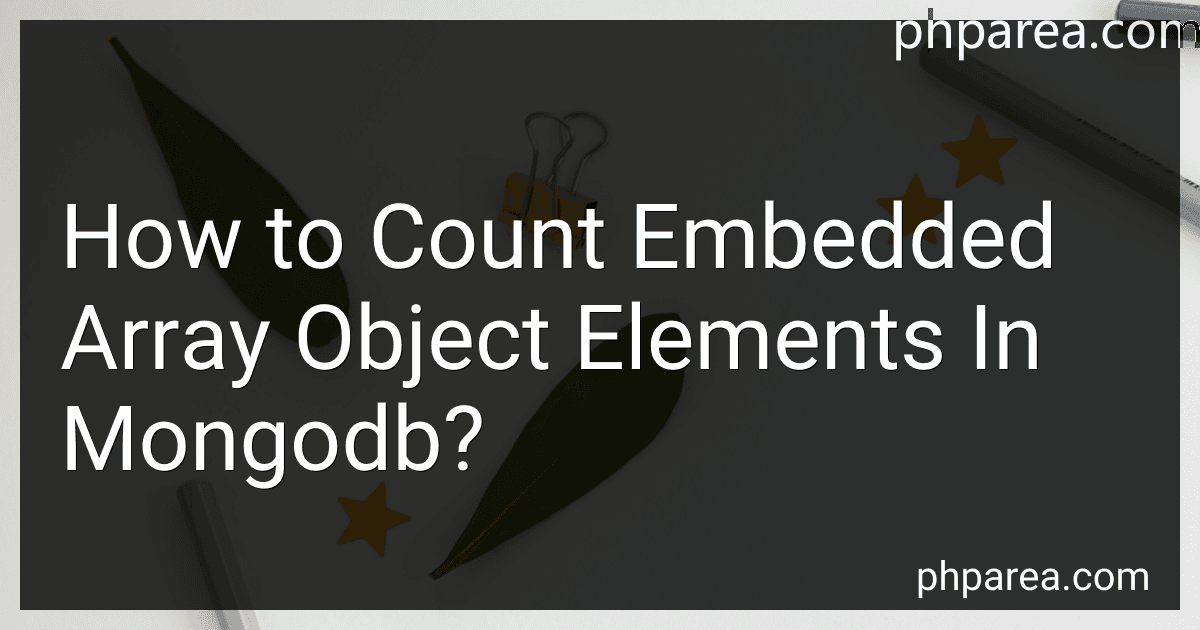 11 min readTo count elements within an embedded array in a MongoDB document, you typically use the aggregation framework along with the $size operator. Begin with a $project stage to add a new field representing the size of the array using $size. Follow with a $group stage to aggregate the counts as needed. If you require a count of all elements across multiple documents, you may use $unwind to deconstruct the array, which effectively turns each element into a separate document.
11 min readTo count elements within an embedded array in a MongoDB document, you typically use the aggregation framework along with the $size operator. Begin with a $project stage to add a new field representing the size of the array using $size. Follow with a $group stage to aggregate the counts as needed. If you require a count of all elements across multiple documents, you may use $unwind to deconstruct the array, which effectively turns each element into a separate document.
-
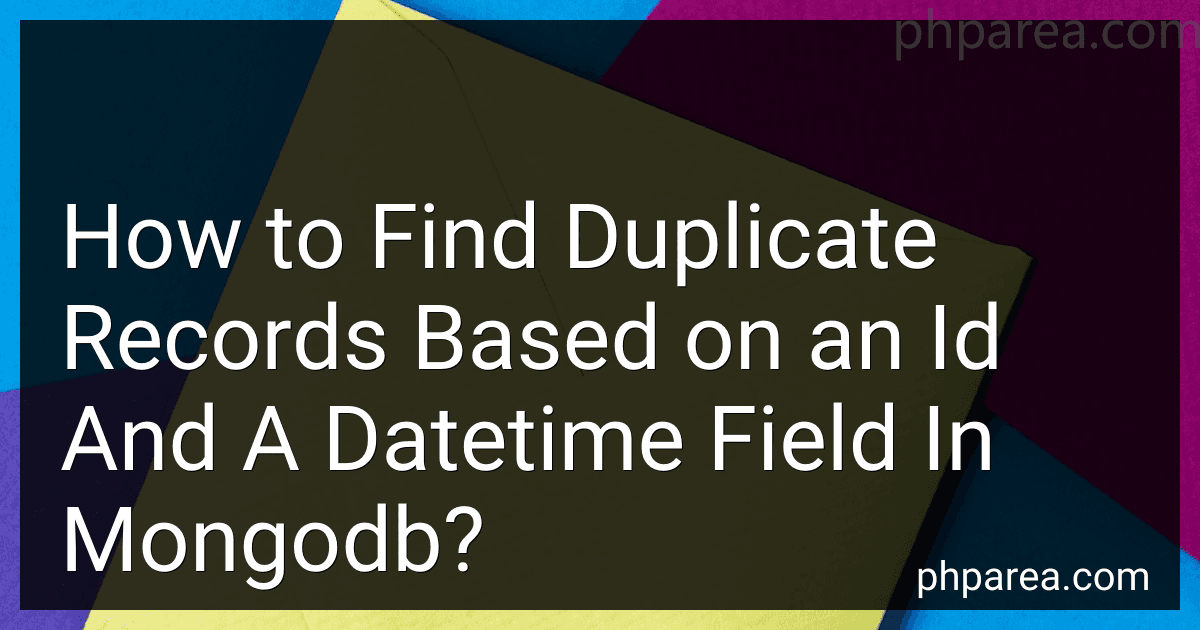 10 min readTo find duplicate records in MongoDB based on an id and a datetime field, you can use the aggregation framework to group documents by these fields and then filter for groups having more than one document, indicating duplicates. Here's a general approach: Use the $group stage to aggregate the records by the id and datetime fields, creating a document for each unique combination and including a count of the number of occurrences.
10 min readTo find duplicate records in MongoDB based on an id and a datetime field, you can use the aggregation framework to group documents by these fields and then filter for groups having more than one document, indicating duplicates. Here's a general approach: Use the $group stage to aggregate the records by the id and datetime fields, creating a document for each unique combination and including a count of the number of occurrences.
-
 13 min readTo store user-specific data in MongoDB, you should first design an appropriate schema that reflects the data structure and relationships. Begin by creating a dedicated collection for the user data, which allows for scalability and efficient querying. Each document within this collection should represent an individual user or a specific set of user data, utilizing fields that correspond to the attributes you want to track, such as username, email, and other relevant information.
13 min readTo store user-specific data in MongoDB, you should first design an appropriate schema that reflects the data structure and relationships. Begin by creating a dedicated collection for the user data, which allows for scalability and efficient querying. Each document within this collection should represent an individual user or a specific set of user data, utilizing fields that correspond to the attributes you want to track, such as username, email, and other relevant information.
-
 9 min readTo match a specific value in a JSON object in MongoDB, you would use the $match stage in an aggregation pipeline. The $match stage filters the documents to pass only those documents that match the specified condition to the next stage in the pipeline. You can use query operators to specify the condition. To match an exact value in a field, you would typically specify the field name and value in an object format.
9 min readTo match a specific value in a JSON object in MongoDB, you would use the $match stage in an aggregation pipeline. The $match stage filters the documents to pass only those documents that match the specified condition to the next stage in the pipeline. You can use query operators to specify the condition. To match an exact value in a field, you would typically specify the field name and value in an object format.
-
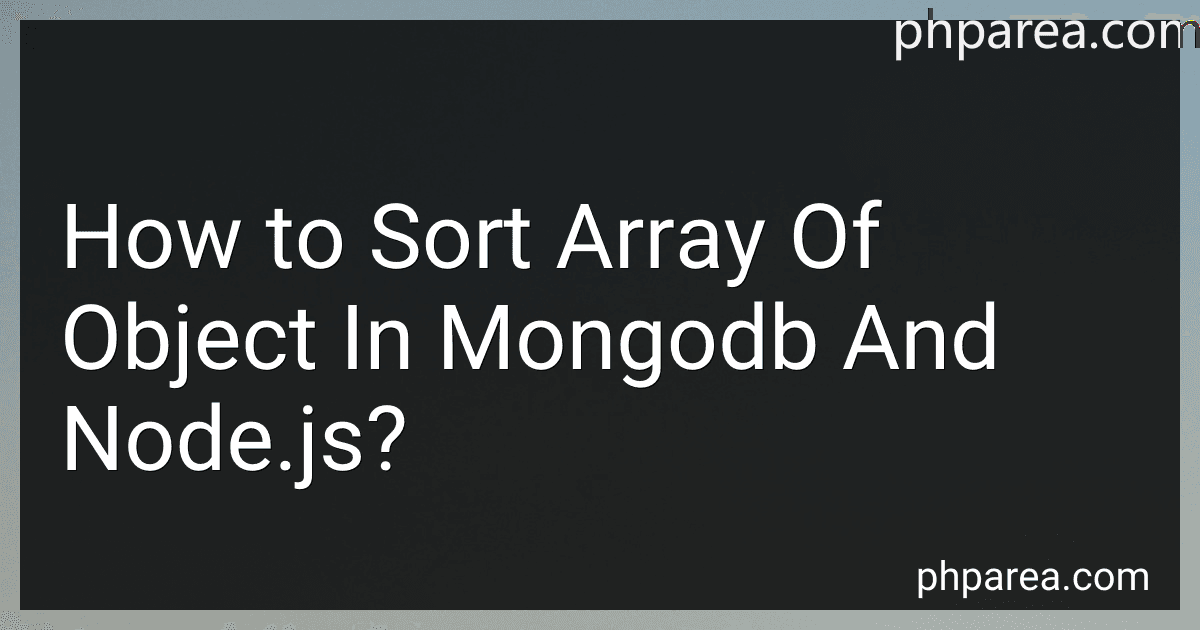 6 min readTo sort an array of objects in MongoDB using Node.js, you typically utilize the MongoDB query language within your Node.js application. To do this, use the MongoDB driver or an ORM like Mongoose. In a MongoDB query, sorting is achieved by using the sort() method, which specifies the field by which you want to sort and the order (ascending or descending).
6 min readTo sort an array of objects in MongoDB using Node.js, you typically utilize the MongoDB query language within your Node.js application. To do this, use the MongoDB driver or an ORM like Mongoose. In a MongoDB query, sorting is achieved by using the sort() method, which specifies the field by which you want to sort and the order (ascending or descending).
-
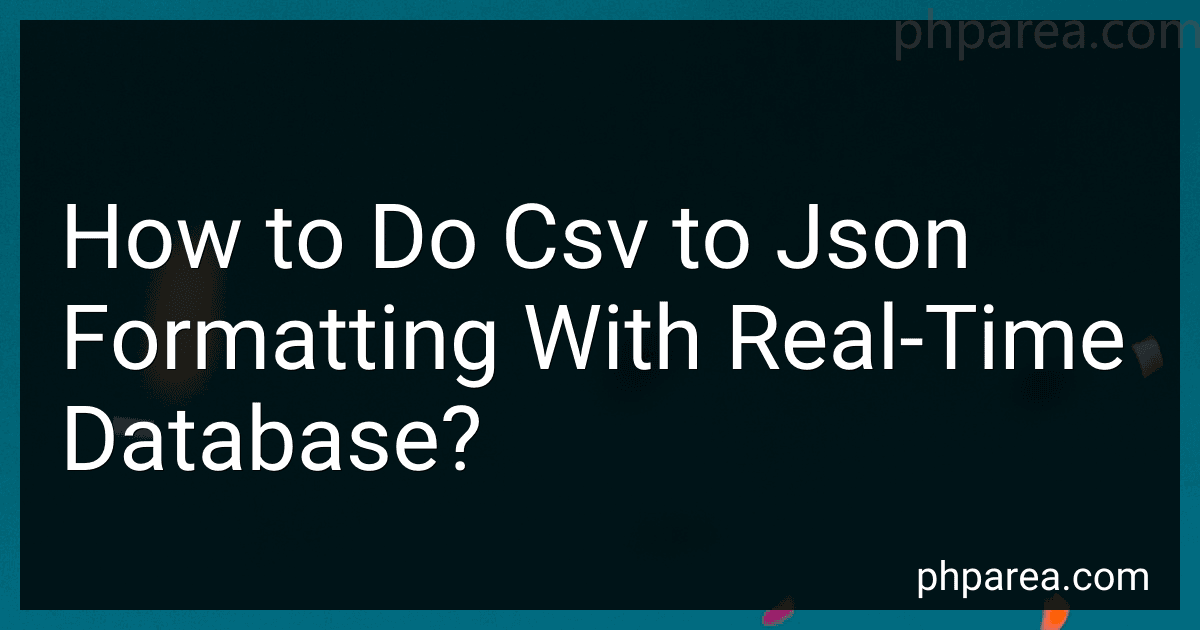 14 min readTo convert CSV data to JSON format with a real-time database, you first need to read the CSV data using a library like pandas in Python or by using native CSV functions in other languages like JavaScript. Once the CSV is read into an in-memory data structure like a dataframe or an array, you can transform this data into a JSON object. Next, connect to your real-time database (e.g., Firebase, AWS DynamoDB, or any similar service) using the appropriate SDK or API.
14 min readTo convert CSV data to JSON format with a real-time database, you first need to read the CSV data using a library like pandas in Python or by using native CSV functions in other languages like JavaScript. Once the CSV is read into an in-memory data structure like a dataframe or an array, you can transform this data into a JSON object. Next, connect to your real-time database (e.g., Firebase, AWS DynamoDB, or any similar service) using the appropriate SDK or API.
-
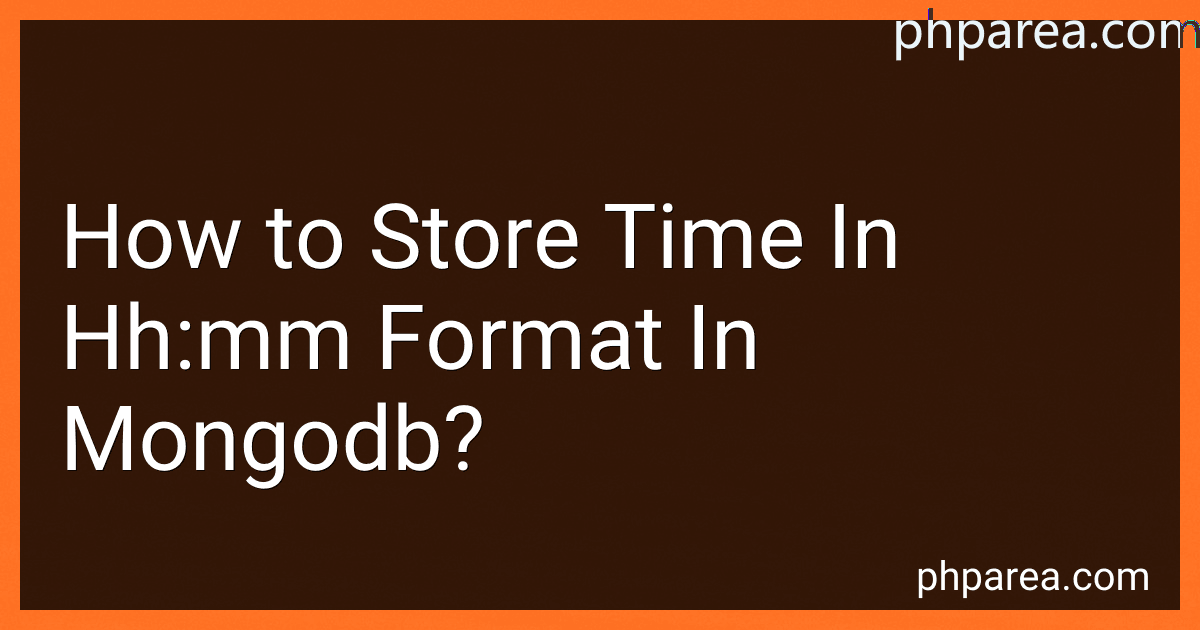 12 min readTo store time in "hh:mm" format in MongoDB, it's common to store it as a string. MongoDB itself does not have a specific data type for time-only values without dates, so strings are often used to maintain the format. When querying or manipulating these values, you'll handle them as strings. Alternatively, you could store time as a Date object with a fixed date component or use an integer value representing the total minutes since midnight.
12 min readTo store time in "hh:mm" format in MongoDB, it's common to store it as a string. MongoDB itself does not have a specific data type for time-only values without dates, so strings are often used to maintain the format. When querying or manipulating these values, you'll handle them as strings. Alternatively, you could store time as a Date object with a fixed date component or use an integer value representing the total minutes since midnight.